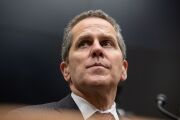
High import costs could have an outsize impact on Main Street, a Federal Reserve official warned Thursday, adding that the hardships could have a long shelf life.
Fed Gov. Michael Barr, in prepared remarks, said
"Potential disruptions to supply chains and distribution networks are particularly acute for small businesses, which are less diversified, less able to access credit, and hence more vulnerable to adverse shocks," Barr said in recorded remarks for the Federal Reserve Bank of New York's 2025 Northeast/Mid-Atlantic Small Business Credit Symposium.
Widespread disruption to small businesses could have substantial ripple effects, he added.
"Small businesses play a vital role in production networks, often providing specialized inputs that can't easily be sourced elsewhere, and business failures could further disrupt supply chains," Barr said. "As we saw during the pandemic, such disruptions can have large and lasting effects on prices, as well as output."
This is the second time in as many weeks that Barr has discussed the small-business implications of tariffs and trade policy uncertainty more broadly. He highlighted the topic last Friday during a
Given the pivotal role of small businesses in domestic and international supply chains, a wave of business failures would likely contribute to a surge in prices and a decline in overall growth, Barr said.
Businesses with fewer than 500 employees collectively punch above their weight class in terms of economic impact, he said.
Firms of this size account for almost half of private-sector employment, 40% of sales revenue and 40% of private-sector wages, Barr said. He added that new business creation since the COVID-19 pandemic has contributed to an uptick in productivity that enabled the economy to recover while inflation declined.
"It is no coincidence that this productivity surge occurred while the creation of new businesses was also surging," Barr said. "For instance, small businesses are responsible for 16 times as many patents per employee as larger businesses. Small businesses play an important role in innovation and economic growth."
Beyond the trade uncertainty, Barr said the economy is otherwise on solid footing, with unemployment remaining near historic lows and inflation trending toward the Fed's 2% target.
Still, he said, small businesses face many issues unrelated to current economic conditions and policy uncertainty, including access to skills, strategic connections and credit. He said banks and governments have a role in closing these gaps.
He highlighted his own work — prior to joining the Federal Reserve — of setting up a loan-loss fund for small businesses in Detroit as an example of how the private and public sectors can come together to help banks support entrepreneurs.
"There are many ways to help address these gaps," Barr said. "The loan-loss fund helps banks to reach deeper into the small business market by mitigating downside risks to lending."






